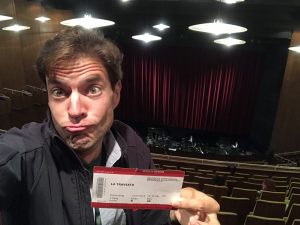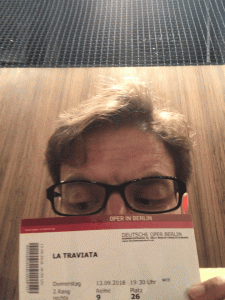A few years ago, my brother really got into opera. Last year… or maybe the year before… he and I went to catch a few performances in Santa Fe, NM. I enjoyed them, albeit not as much as he did. It’s a good night out, especially when seeing it with somebody super into it. And yet amongst the seven performing arts there are others that I prefer. Even without Steve, I thought I’d check out the Berlin Opera tonight.
Quick digression to discuss the seven performing arts. This came about 15-20 years ago over drinks with our friend Rex. He mentioned that circus is one of the seven performing arts. And he should know – Rex literally ran away as a kid to join the circus. Over the years, I’ve tried to think what the other six might be – magic, musical theater, ventriloquism… but does “vaudeville” chine a few of those in one? I’ve tried repeatedly asking Rex now and again and he usually just chuckles and says, “I said that? It sounds like me but I have no idea what the seven might be.” But he does confirm “circus” is definitely one of the seven.
In any case, I’m off to the opera tonight. I bought one of the last tickets available for Verdi’s “La Traviata.” It’s in the very last row, which I have to assume is the very definition of a nosebleed seat. But when in Berlin….
***
There are a couple of Opera Theater companies in Berlin and I happened to pick The Deutsche Oper Berlin. It’s not the prettiest opera house I’ve ever seen — hailed as a “mammoth black box of acoustic wonder” by EuroCheapo.com, I was struck by just how modern and yet uncomfortable the venue was.
Admittedly, I was in the very last row, in the cheapest possible ticket I could find, but they felt more like high school auditorium seats than comfy uppercrust highfalutin theater box seats.
EuroCheapo also forewarned about the staff —
I absolutely met one at WILL CALL. He was gruff and not exactly courteous but at least I wasn’t physically or verbally abused.
As for the opera itself, Verdi’s “La Traviata” was well worth seeing, staged in a forced perspective majestic “hall” of excess and country living. I’m going to summarize a bit here in a style I can’t believe I’m embracing. In high school we watched a video of Mel Gibson describing “Hamlet” to a classroom and he tried to make it accessible for the kids by chronicling how Hamlet’s uncle, “let’s call him Claude…” murders his father and marries his mother. I will always remember Mel calling Claudius “Claude” and how it made my English teacher cringe. Whether through mirroring or out of respect for her or possibly my own internal compass, I too found it odd to have the name shortened that way. Guy’s name is Claudius. So what? Is “Claude” somehow easier to understand? I don’t know. But I’m going to try a “Mel”-ism take on “La Traviata,” an opera in three parts about a “fallen woman.”
Please understand — this is a really poor summary by me. If you want a more detailed version, here’s a wikipedia link for ya.
LA TRAVIATA by Giuseppi Verdi (1853)
Violetta, let’s call her Vi, is a party girl. A courtesan who throws the best shindigs mixing high and low with bacchus debauchery. She also has a terminal illness. Alfredo (AKA “Al”) has loved her from afar for a year and finally tells her. She at first denies the love because a girl like her, well, she only ever gets temporary love, not true love. But Al wins her over and she decides to forgo the party life and settle down with him.
Cut to three weeks later and her opulent country living with Al has cost a small fortune, so much so that she is going to sell everything back in Paris to prolong the life of leisure and comfort they’ve grown accustomed to. Al finds out and sets out to stop the unnecessary sale as he has plenty of money. Meanwhile, Al’s father Giorgio (“Daddy G”) comes to meet Vi and wants to convince her to break up with Al for the good of the family. Al’s sister is engaged to a wealthy guy but he’s going to drop her if her family includes such a scandalous in-law as Vi. Overcome with emotion, and knowing full well she’ll be dead soon, she agrees reluctantly as she thinks it proves her true love for Al. Her one condition is that at the end of her life, Daddy G tells Al the truth so that he knows how much she truly loves him.
When the break happens, Vi heads off to a party with her former paramour and this only infuriates the heartbroken Al. He decides he’ll gatecrash and confront the woman who he thinks lied to him and in the party he tosses money at her feet, paying Vi for her “services.” It’s a scandal unto itself and the partygoers berate him… even Al’s dad berates him for going too far. Vi’s ex-paramour challenges Al to a duel and Vi asks Al to skip it, not because she’s afraid Al will win but she’s afraid he might get hurt. Al will hear none of it.
The following morning, Vi is on her deathbed, heartbroken and devastated. But what’s this? Al is on his way, having been told the truth by his father. He arrives just in time to make peace with his true love, to re-affirm his devotion… and while Vi briefly rallies at such joy, she quickly succumbs and Al is left cradling her lifeless body, his heart broken, the music swelling…
***
As stories go, it’s a fairly typical tale of secrets and lies causing all kinds of problems. I was originally quite angry at a tale that posits that class and familial obligations would trump love or an individual’s happiness. Yet, I want to believe the narrative is about why that is in fact wrong. At least the very least that’s the supposed “twist” ending. In truth though the high cost, aka death, of the common woman in the face of the face-saving needs of the upper echelon is rather distasteful to me. Look, I know we all screw up our relationships with poor communication skills… or at least, I have. And I know we try our best to find the right balance in the various push-pulls of our family, friends, lovers, and society. I think it’s a lot harder to get it right though than not. But in my narratives, I want to believe in the power of true love, in the happily ever after. I’m a sucker for a romantic comedy and usually (but not always) a bit put off by romantic tragedies… I think because there’s enough tragic in real life (IRL for the kids). Or at least, that’s how I was feeling as I watched “La Traviata” last night. I didn’t need a happy ending; I just couldn’t shake off the annoyances at the father and society giving Vi such a hard time for living her life.
Opera in general leaves me appreciative of the artform but not always moved emotionally. I don’t think it’s the subtitles (last night they had English and German translations projected high into the rafters… or about at my eye level from where I was sitting). I’ve loved many a subtitled “foreign film” that involves scanning a subtitle and watching the visuals, with me still feeling the emotional impact. Certainly the leads last night were talented and quite effective in conveying the emotional arc of the story — the woman playing Violetta, Elena Tsallagova, was particularly good — I had one of those snobbish theater going moments in the play proper.
The crowd scenes, especially the parties and the entr’acte “gypsy” scene that opens the second half, were filled out by players, some great and some, well…. When the crowd is moving about the stage to convey flow and to hit marks, they all worked fluidly. But for group choreographed dance numbers, some were just a bit… off. It’s perhaps unfair to critique the dancing when performances are fewer and farther inbetween, when there’s usually a repertory performance schedule wherein it’s Verdi one night and Mozart another. So the ensembles may not be as rehearsed and finely tuned on some of those dance moves. But when everyone is twirling right except one who inexplicably twirls left, nearly knocking over her chorus scene partner, it kind of sticks out. Still, who am I to judge? I can’t sing, I can’t dance, not even in a karoake or night club. But nobody was paying 24 euros to see me either. So I guess I can judge. And this being the internet, my opinion is just as valid as Conrad L. Osborne.









